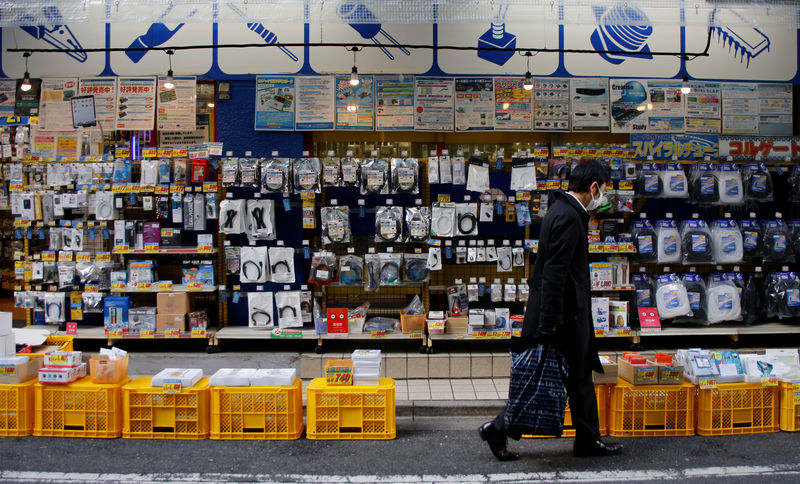By Tetsushi Kajimoto
TOKYO (Reuters) - Japanese retail sales grew at the strongest pace in 5-1/2 years in September as consumers rushed to buy big-ticket items to beat a rise in the country's sales tax, raising concerns spending could pull back sharply in the coming months.
The increase in national sales tax to 10% from 8% on Oct. 1 is seen as crucial for fixing the industrial world's heaviest public debt at more than twice the size of Japan's economy.
But some analysts worry the twice-delayed tax hike could tip the world's third-largest economy into recession, underscoring the challenge for the central bank to sustain growth and accelerate inflation towards its 2% inflation target.
Wednesday's data is among key indicators to be scrutinized by the Bank of Japan, which holds its two-day policy review that ends on Thursday when it issues its quarterly projections of economy and prices.
The BOJ may hold off on loosening policy at its review as stable markets, a truce in U.S.-China trade talks and robust domestic demand give it room to save its limited ammunition.
Retail sales in September jumped 9.1% from a year earlier, boosted by a 16.9% increase in car sales, and household durables such as refrigerators, computers and TV, and cosmetics, food and clothing, trade ministry data showed on Wednesday.
The surge in spending ahead of the sales tax hike bodes ill for fourth-quarter private consumption, some analysts say, although it may help push up economic growth in the last quarter.
"The data released today suggests that private consumption may have risen by 1.5% quarter-on-quarter in the third quarter," Marcel Thieliant, senior Japan economist at Capital Economics, said.
"The risks to our forecast of a 1.7% quarter-on-quarter drop in consumption in the fourth quarter are probably tilted to the downside."
The retail sales reading handily beat a 6.9% gain expected by economists in a Reuters poll, posting the fastest annual growth since March 2014 when retail sales jumped 11% one month before the previous tax hike.
Seasonally-adjusted retail sales grew 7.1% month-on-month in September, the data showed.
The trade ministry raised its assessment of retail sales to describe it as increasing.
But it added that it must stay vigilant to consumer sentiment after the tax hike and monitor any effects a recent slew of natural disasters may have on the economy.
The previous tax hike to 8% from 5% triggered a deep slump in private consumption and the broader economy as a big pull-back in demand followed the last-minute buying by consumers ahead of the hike.

Policymakers maintain that such a big swing in demand has not occurred this time round, given the smaller extent of the tax hike and various government measures to ease the burden of higher costs, such as shopping vouchers and other incentives.